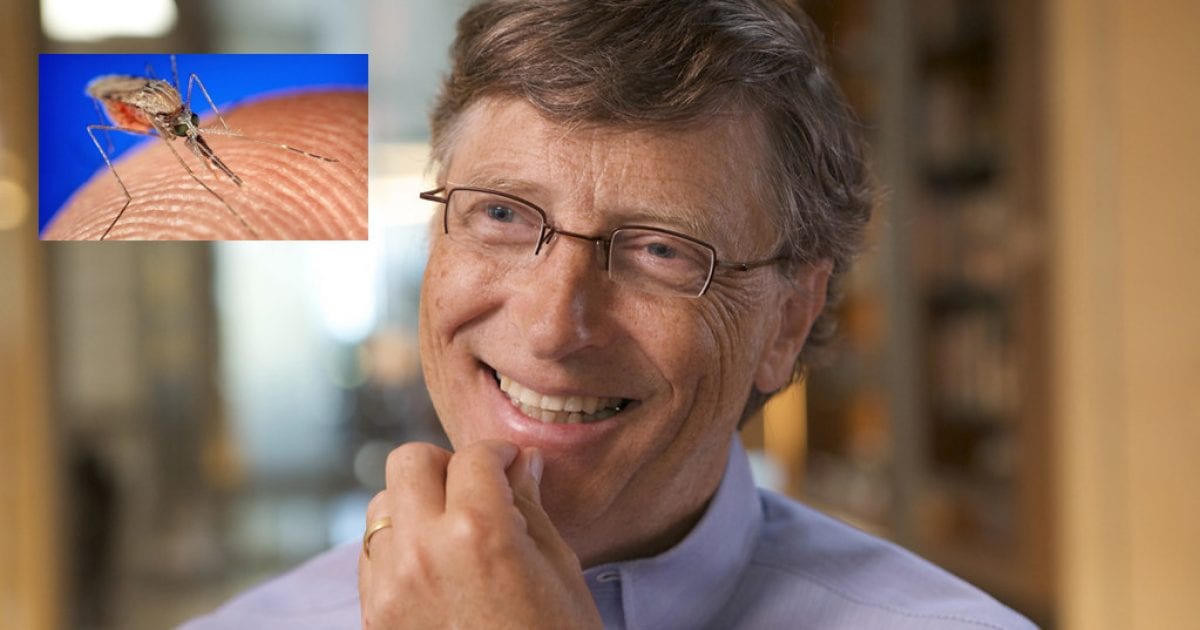Yes, you read that headline right.
Let's break it down.
Oxitec is a Gates Foundation sponsored company.
Oxitec has created "genetically modified mosquitos".
And Oxitec is set to release 750 MILLION of them on Florida.
What could go wrong?
When will Bill Gates stop trying to play God?
Because honestly, he's not very good at it.
Read it and weep friends, it's true:
And just in caes anyone doubts Gates' involvement, here it is right from the Gates (of Hell) Foundation Website....
Funding of $5.2M into Oxitec back in 2018.
Here are more of the details, from Fast Company:
In the Florida Keys, the local mosquito control agency has just approved the release of 750 million genetically engineered mosquitoes. The test, which is likely to begin in 2021, will be the first time that mosquitoes—designed to be “self-limiting,” meaning that they’ll breed offspring that can’t survive—will be used in the United States.
Oxitec, the U.K.-based company that engineered the mosquitoes, plans to place boxes filled with mosquito eggs in the area, releasing male mosquitoes bred with the self-limiting gene. When they breed with female mosquitoes, female offspring won’t survive. Because only female mosquitoes bite humans, this can help stop the spread of disease. The species they’re targeting is the Aedes aegypti or “yellow fever” mosquito, an invasive species that transmits diseases such as dengue, chikungunya, and Zika.
“With repeated releases over a number of weeks, the population of females gradually reduces,” says Kevin Gorman, Oxitec’s head of global field operations. “And we end up with vector control. It’s taking away that vector that is intended to reduce the incidence of disease.”
In previous tests in other countries including Brazil, the company says that the process has worked to dramatically shrink populations. “We’ve had multiyear programs giving over 80% control in every single year,” he says. “And that far exceeds typically what people get trying to control Aedes aegypti with chemicals, because aegypti is very resistant. It’s not usually present in super-high numbers. So it can be difficult to actually reach.”
The startup also claims that it’s a more environmentally friendly way to control mosquitoes, because it’s possible to target only a particular species, and after around 5 to 10 generations, the modified gene will be removed from the population (since the females with the gene die, halving the number of modified bugs each generation), leaving no ecological footprint. Advocacy groups, however, argue that the technology hasn’t been tested enough, and it could potentially have unintended effects.
“If they do work to reduce the number of Aedes aegypti, other mosquitoes might move into their niche,” says Jaydee Hanson, policy director for the International Center for Technology Assessment and Center for Food Safety. “The most likely one is the Asian Tiger mosquito, which is better at carrying some illnesses like West Nile.” (Oxitec says that as it has tested its mosquitoes in other areas, it hasn’t seen significant increases of the Asian Tiger mosquito.)
Hanson also says that the company needs to do more lab testing to understand how the mosquitoes might impact local species that eat the insects. “Every environment is different,” he says. “We would like them to mock up the Florida environment before they release three-quarters of a million mosquitoes.” He argues that there’s also a risk that the engineered mosquitoes could cross-breed with native species, creating hybrids that might be more resistant to insecticides. He thinks that the EPA, which gave approval to Oxitec earlier this year, didn’t do due diligence.
And from the Daily Mail:
Scientists monitoring a population of genetically modified mosquitoes released in Brazil to curb native disease-carrying pests say the plan appears to have backfired, instead giving rise to new generations of hardier, hybrid offspring.
The study led by a Yale University team working with researchers from Brazil investigated the impact of transgenic Aedes aegypti mosquitoes developed by British biotech firm, Oxitec.
Over the course of roughly two years, Oxitec released tens of millions of its genetically modified insects throughout the city of Jacobina.
If all were to go according to plan, these new male mosquitoes would mate with native females and produce nonviable offspring, causing the population to dwindle over time. But, the researchers say isn’t what happened.
The Yale study found that Jacobina is now home to ‘a mix of three populations’ as a result of the release – and the hybrids appear ‘sufficiently robust to be able to reproduce in nature.’
Oxitec, however, has hit back at the findings and slammed the claims as ‘false, misleading and speculative,’ arguing that the possibility of the modified mosquitoes’ genes mixing with the local population has been a point of consideration from the start, and that these ‘self-limiting’ genes do not spread in the wild.
An Oxitec spokesperson told Dailymail.com the company has filed an official complaint to the study's publisher Nature in response to the ‘inaccurate’ report.
The controversy comes after the biotech firm released about 450,000 genetically modified mosquitoes each week for 27 months in Jacobina as part of a plan to fight mosquito-borne diseases, including yellow fever, dengue fever, chikungunya, and Zika.
‘The claim was that genes from the release strain would not get into the general population because offspring would die,’ said senior author Jeffrey Powell, professor of ecology and evolutionary biology at Yale.
‘That obviously was not what happened.’




Join the conversation!
Please share your thoughts about this article below. We value your opinions, and would love to see you add to the discussion!